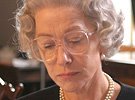
"The Queen"
Director: Stephen Frears
Fien Print Rating (Out of 100): 69 (Same as "Marie Antoinette" for whatever reason)
In a Nutshell: I didn't dislike Stephen Frears' "The Queen," but I need somebody to explain to me why it was made. Or, to be more specific, I need an explanation for why, nine years after Princess Diana's death, this was the time to explore the royal family's reaction to the tragedy and why, in turn, that reaction had to be a feature film, rather than a BBC or HBO telefilm. Or maybe I just need an explanation of why *this* was the movie to be made on the subject. A perfectly interesting fly-on-the-wall piece full of interesting details, unexpected humor and fine performances, "The Queen" lacks a narrative imperative, a thematic motivation.
I like Stephen Frears, "The Queen" could have been made by any number of competent directors of the British big and small screen. Screenwriter Peter Morgan, rather than Frears, drives this talky film, which spends much time explaining the protocol of British Royalty and government, exposition which is much more for the audience than for the characters on screen, which caused the former writing student in me to scream, "Show me, don't tell me!"
And, in the process, the movie bends over backwards to offend nobody. The Queen is out of touch with reality, but she's a noble woman who has spent too long in too difficult a position, a position made more difficult by the need to show love for a woman who dedicated her life to undermining her. Tony Blair is a modern man and a progressive thinker, but he holds traditional values and cares too much, perhaps, for many of the establishment institutions he swore to tear down. If "The Queen" wanted to be political, it could have made more hay from Blair's decline from leftist innovator into a man who may not best be known as George W. Bush's willing lap-dog. Instead, the movie is anonymous.
Oscar prognosticators -- folks like Jeffrey Wells, David Poland and, at the very nadir, Tom O'Neil -- love deciding the Academy races early and Mirren has already been given the Oscar for the year. Bravo. And she's great here, playing a far more muted, internalized performance than you typically see drawing this kind of awards attention. The performance is all in subtle intonation and mannerisms and how she, as the God-saved Queen, carries herself. But I suspect that Mirren is going to win an Oscar this year because she's Helen Mirren and she doesn't have an Oscar and not because this is somehow the finest performance of her career. A reasonable and possibly correct argument could be made that in the calendar year, this is Mirren's third best filmed performance, following her Emmy-winning work as a different Elizabeth in HBO's eponymous film and the latest incarnation of her "Prime Suspect" franchise. You don't see that very often.
I'd like to see more buzz, incidentally, for Michael Sheen's performance as Blair, as he manages to look both foppish and pragmatic in a very interesting way.


